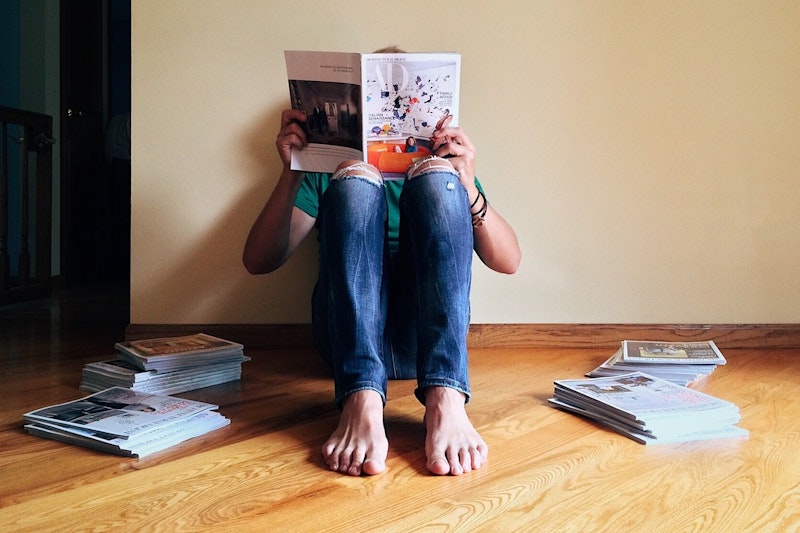In a future where the printed word has become as archaic as the Atari 2600, and the notion of a “newsstand” elicits puzzled looks from the youth, I bring to you the zenith of our collective retreat from intellectual engagement: Zero Magazine. In this bustling dystopia of diminished attention spans, where the act of reading has been relegated to the annals of ancient history alongside other unnecessary arts like handwriting and face-to-face conversation, Zero Magazine shines as a beacon of progress (or regress, depending on whether you’re asking one of those old duffers shaking his fist at a cloud). It's an online-only magazine designed for the discerning poster who, finding himself occupied with the low-effort labors of his Phone Hand (PH) and his Goon Hand (GH), has absolutely no time or desire to read. You heard right—I’m talking about a magazine you can proudly claim to follow without the cumbersome necessity of reading it.
Imagine, if you will, being able to not read the entire magazine in a breathtaking 0.0 seconds a day. It's perfectly optimized for social media: you can mute it in your feed, and it wouldn't make the slightest difference to your consumption of juicier posts or the hollow interaction they’re designed to elicit. For those who’re perpetually busy crafting their next viral banger of a post, engaged in the latest superficial online outrage, or simply occupied with the work of their PH and GH, I can offer an even more direct route to “enlightenment”—the magazine comes in an injectable version, delivered seamlessly through a 23-gauge needle you can jab directly in your thigh, ensuring you can “feel the takes” without wasting precious seconds you don't have.
But why stop at not reading when we can revolutionize entertainment and gambling together? Enter Zero Scares, a gambling app that doubles as a dark, twisted circus of thrill and despair where attention spans go to die, and bank accounts dwindle with the flick of a thumb. Here, in this arena of 10-second terror, viewers can bet on the uncertain fates of characters in AI-generated micro-episodes so short, they end almost before they begin. It's a world where investment in narrative or character development is as redundant as the concept of patience, and the only real suspense is whether you'll double your money or lose it as quickly as your interest in the plot.
In that case, smart money is on the gambling house. The sports betting industry has ballooned to astronomical proportions in the United States, with gross revenue hitting a staggering $7.5 billion in 2022, marking a nearly 75 percent increase from the previous year. This is part of a broader trend where Americans have wagered over $310 billion since the Supreme Court struck down former New Jersey Sen. Bill Bradley’s well-intentioned Professional and Amateur Sports Protection Act in June 2018, with the total take for 2023 alone surpassing $119 billion, up 28 percent from 2021. The convenience and ubiquity of online betting platforms—addiction by design, with data scientist-managed apps blasting can’t-miss offers to your phones all the livelong day—have undoubtedly fueled this growth, with giants like FanDuel and DraftKings dominating the market and making up a significant chunk of the market share.
In the background, whispering sweet nothings into the ear of this frenzied consumption, we find existing examples like ReelShort—an app that epitomizes our love affair with the ephemeral. It feeds the voracious appetite of viewers with minute-long, melodramatic content tailor-made for the eyestrain-inducing, insomnia-provoking smartphone screen. Think of it as the ultimate marriage between the Lifetime movie and TikTok, designed for an audience that considers a three-minute video an unbearable commitment. ReelShort, with its parade of cookie-cutter melodramas like “The Double Life of My Billionaire Husband,” thrives by exploiting our diminishing attention spans and our insatiable hunger for content that demands nothing from us, not even a minute of our attention.
Meanwhile, the act of reading content is on a precipitous decline. The trend towards these shorter, more digestible content formats caters to dwindling attention spans, exacerbated by the omnipresence of social media and instant gratification digital culture. The shift is so pronounced that even traditional forms of entertainment and news consumption are being reshaped into formats that require minimal engagement or intellectual investment from the audience.
This is the future of content consumption in our beautifully dystopian society—a landscape dominated by the desire for instant gratification and an aversion to anything that requires a modicum of serious effort or concentration. It's a world where newspapers fade into oblivion, books are relics for the nostalgic or talismans for the dorky, and the act of reading is a quaint, laughable endeavor from a bygone era, akin to donning the robe and slippers and smoking the pipe. Of course, as Adam Fox makes clear in Oral and Literate Culture in England, 1500-1700, the progress from Gutenberg’s Bibles to a world of ever-increasing print materials and literacy was far less seamless than either Marshall McLuhan (The Gutenberg Galaxy), who argued that literacy rewired human cognition, or Elizabeth Eisenstein (The Printing Press as an Agent of Change), who rebuked McLuhan but still presented the printed word as the tool that launched a rapid-fire worldwide communications revolution, would claim. Sitting on the recliner and leafing through the paper represents a curious and fairly brief moment in time, albeit one that briefly united the world’s increasingly harried middle-middle class (the “Midol class,” my father used to call them).
At any rate, as we plunge headfirst into this abyss, one can't help but marvel at the ingenious ways we keep devising to distract ourselves from accessing the depth and richness of the human experience. Welcome to the future of Zero Magazine and Zero Scares—a new “Dark Ages of the Mind” in which we consume without experiencing, bet without caring, and inject content directly into our bloodstream, all in the noble pursuit of feeling something, anything, in an age when genuine emotion is the scarcest and least sought-after commodity of all.

